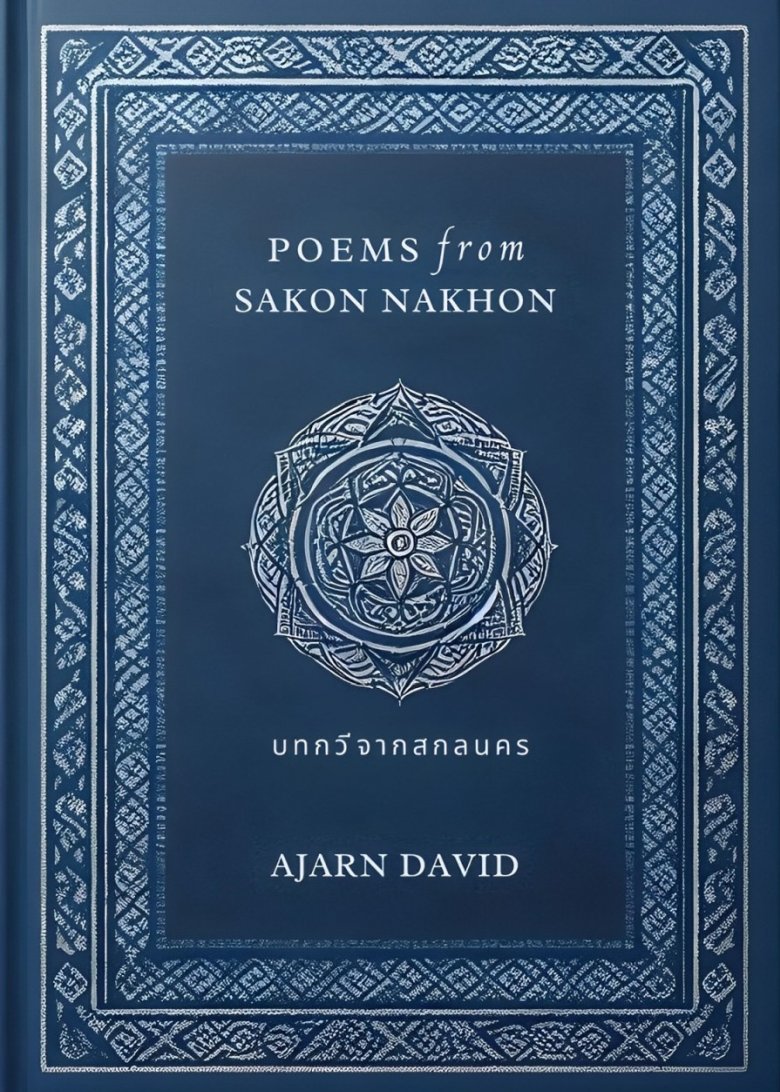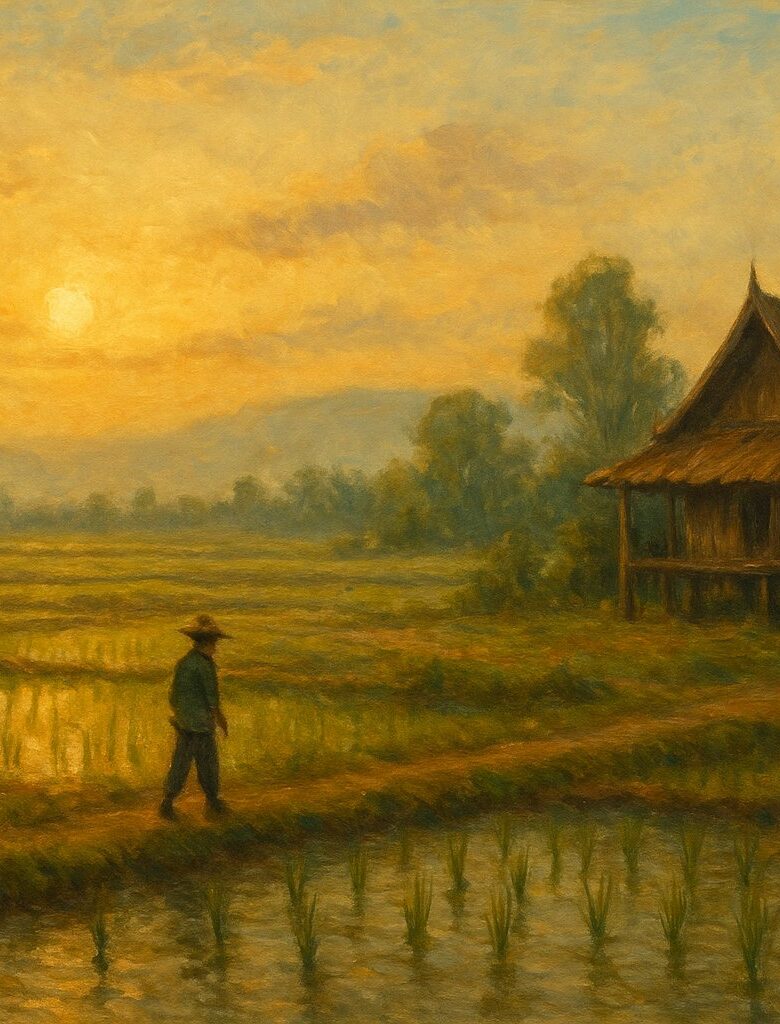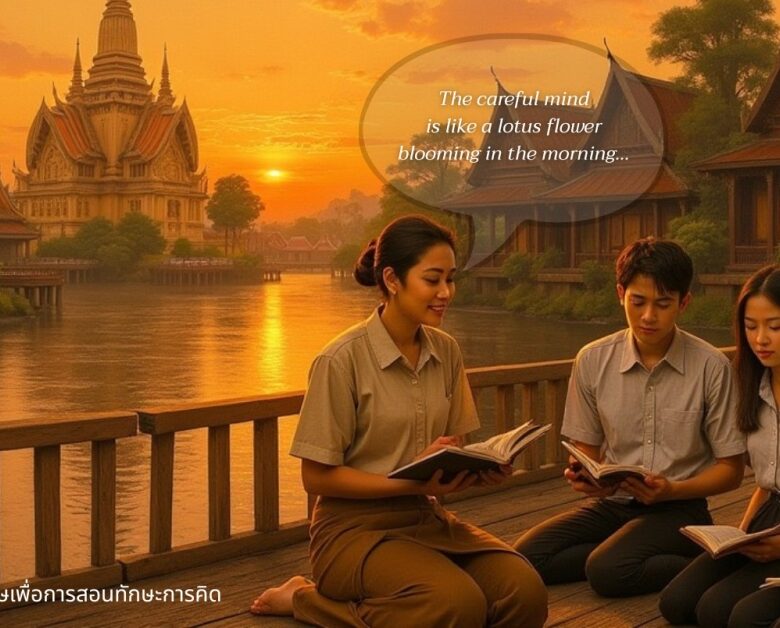"Whether you’re a traveler yearning to deepen your understanding of Thailand, an expat seeking connection to its culture, or simply a curious reader, "Poems from Sakon Nakhon" offers a journey that enriches the self. "
Thai Poetry in English
I
f you’ve ever wanted to understand Thailand beyond its postcard-perfect beaches and vibrant street food scenes, Poems from Sakon Nakhon by Ajarn David is your passport to the soul of the country.
This bilingual collection of poetry provides an intimate lens into the rhythms of rural life, Buddhist philosophy, and cultural values that shape the Thai experience.
Written in both English and Thai by an American expat who has lived in Thailand for 20+ years, the book is as much a cultural guide as it is a literary work, inviting readers to learn not just about Thailand but to feel it.
A Window into Rural Isaan Life
T
hailand’s northeastern region, Isaan, often remains hidden from the typical tourist itinerary. Yet, it is here, in the rice paddies and villages of Sakon Nakhon, that the essence of Thai culture thrives.
Ajarn David’s poetry captures this world with striking clarity. In a poem about the climate, we see a rare depiction of Thailand’s winter:
The cool season in Sakon Nakhon
comes with the smell
of fallen leaves
and morning fires
lit with coal.
It’s a quiet, contemplative moment that contrasts with the tropical heat most visitors associate with the country. The poem also nods to the Catholic community in the region, blending the sounds of Christmas carols with temple drums — an unexpected but harmonious snapshot of cultural diversity.
Buddhist Philosophy Made Tangible
T
hai culture is inseparable from its Buddhist roots, and the collection reflects this with poems that distill complex teachings into accessible, everyday wisdom.
For example, Ajarn David explores the (sometimes controversial) act of prostration — so central to Thai Buddhist practice — not as a gesture of servitude but as one of gratitude and reverence:
... a lowering of the self
in gratitude to parents, to teachers,
and to all who sacrifice
for the sake of another.
This poem illuminates a small but meaningful cultural practice, transforming it into a powerful lesson about humility and respect.
Prostration, in its essence, reflects the Buddhist teaching of dissolving the ego to embrace unity — an act not of subservience but of deep awareness and honor.
For readers unfamiliar with such customs, the poem demystifies the symbolism behind a seemingly simple gesture, revealing the layers of wisdom it holds.
Cultural Harmony in Unexpected Places
A jarn David’s Thai poetry in English doesn’t shy away from the interplay between Thailand’s past and its present, revealing how tradition and modernity coexist in daily life.
In a poem about a Thai grandmother, he paints a portrait of an elder whose life is etched into her hands and whose presence speaks to the enduring values of rural Thai culture:
Her old hands read
like a history book
of a simple but storied life,
told by seeds
planted in the earth,
baskets woven
for good purpose....
Through the character of "Mae Yai," the expat poet connects readers to a way of life that honors both labor and love. Her quiet resilience and deliberate movements mirror the pace of rural life, emphasizing a cultural appreciation for mindfulness, care, and generational legacy.
Thailand’s Childlike Humanity
T
his book of 91 Thai poems is not all deep philosophy; it also celebrates the small, everyday quirks that make Thai culture so endearing.
In a poem about Thailand's word for love (rák), Ajarn David reflects on the beauty of language, connecting the Thai word for love to its universal essence through a playful metaphor:
like a stone skipped
across a summer pond,
leaving behind
pretty ripples…
This lighthearted, lyrical exploration of love highlights the Thai tendency to see beauty in simplicity, offering readers an accessible way to engage with cultural nuance.
Thai Poetry as a Cultural Language
B
eyond individual poems, the book’s bilingual format is itself a cultural artifact. The Thai translations sit beside their English counterparts, offering readers the chance to see how ideas are expressed differently in each language.
This format is especially valuable in poems like #32, where Ajarn David explores the deeply Thai concept of shame:
Loss of face in Thai
is "sia naa,"
which means
a spoiled face,
like rotten jackfruit
or raw pork
left out to gather flies.
The vivid imagery here conveys a cultural concept that might otherwise feel abstract to foreign readers.
Through poetry, Ajarn David bridges the gap between language and lived experience, allowing readers to grasp the emotional weight of "saving face" in Thai culture.
Lessons in Spirituality and Nature
I
n a Thai poem about a hermit monk, Ajarn David reflects on the universal human longing for solitude and connection with nature:
Inside everyone
is a hermit monk,
who wants us to escape,
who wants us to walk the forest
with wild animals....
The imagery here is quintessentially Thai, evoking the region’s lush landscapes and the meditative allure of its temples and forests. It’s a call to step back from the chaos of modern life and embrace the simplicity that Thailand embodies so well.
A Thailand Guide for Cultural Explorers
W
hether you’re a traveler yearning to deepen your understanding of Thailand, an expat seeking connection to its culture, or simply a curious reader, "Poems from Sakon Nakhon" offers a journey that enriches the self.
Each poem functions as a small but powerful lesson, drawing readers into the Thai way of life — its humor, its spirituality, and its heart.
This book isn’t just about reading poetry; it’s about experiencing a culture. It’s about listening to the sound of old bamboo creaking in the wind, or watching a monsoon approach. It’s about understanding why the Thai smile isn’t just a gesture but an entire language.
A Poetry Book that Matters
A
jarn David's expat poetry has achieved something rare: he has written a book that bridges cultures, teaching foreigners about Thailand in a way that is both immersive and respectful. Through his poetry, you’ll find not only a greater understanding of Thailand but also a greater appreciation for the universal threads that connect us all.
For those ready to discover the heart of Thailand, "Poems from Sakon Nakhon" is more than a book — it’s an invitation.






